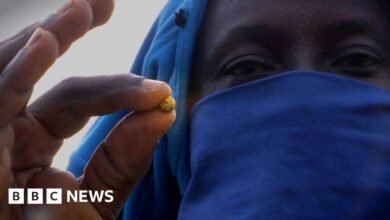‘Church of England to blame for my brother’s death’ – Zimbabwe anger over child abuser John Smyth

Smyth gave talks on masturbation, would sometimes lead prayers in the nude and encouraged naked trampolining, an activity he described as “flappy jumping” – all behaviour noted in an investigation by Zimbabwean lawyer David Coltart that was launched in May 1993.
It was the thrashings that Smyth was giving boys with a notorious table tennis bat, dubbed “TTB”, that led a parent to the door of Coltart, who worked at a law practice in Zimbabwe’s second city, Bulawayo.
She wanted to know why one of her sons had returned from a holiday camp with bruises on his buttocks so severe that she took him to a doctor, who found a “12cm x 12cm bruise”.
“She saw these and demanded to know what happened and then it came out that her son had been badly beaten in the nude, and she came to me for advice,” Coltart, now mayor of Bulawayo, told the BBC.
“When I heard that this was a Christian organisation – I’m an elder in the Presbyterian Church – I got hold of my pastor and we got hold of the Baptist Church, Methodist Church and two other churches in the city and then I was instructed by those churches to investigate the matter,” he said.
Forty-four-year old Jason Leanders, who went on the camp that immediately followed Guide’s death, said he was beaten three to four times a day by Smyth, who would put his hands into his pants to check he had not put on extra layers to cushion his buttocks.
“My bum was black,” he told the BBC. “But being a boy, you act tough.”
For many boarding school students, corporal punishment was regarded as “normal”, former Zimbabwean cricketer Henry Olonga, who was attending the camp the night Guide died, said in his 2015 autobiography.
But after Coltart managed to track down the Rushton report, the severity of the problem became apparent. He wrote to Smyth instructing him to immediately stop the Zambesi Ministries camps.
“It was calculated, he focused on boys. He groomed young men. He encouraged them to take showers in the nude with him. There was a pattern of violence,” he said.
But Coltart’s dealings with Smyth proved difficult.
“He was a highly articulate man and quite aggressive in the meetings that I had with him. He employed all his skills as a barrister to seek to intimidate. He was older than me. I was then a relatively young lawyer in my 30s. He exploited the fact that he was an English QC [Queen’s Counsel].”
Rather than comply with Coltart’s various requests, he doubled down and in a letter to parents ahead of the August 1993 camps, described himself as “a father figure to the camp” and defended the nudity and corporal punishment, writing: “I never cane the boys, but I do whack with a table tennis bat when necessary… although most regard TTB (as it is affectionately known) as little more than a joke.”
This time there appears to have been no cloaking of the beatings as “spiritual discipline” as had been the case in the UK. He also admitted to Coltart that he took photographs of naked boys, but said they were “from shoulders up” for publicity purposes.
Coltart contacted two psychologists with his findings, both of whom advised that Smyth should stop working with children.
Source link



